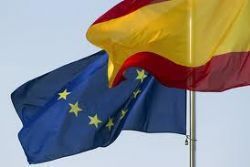- Business
- Childbirth & Education
- Legal Formalities
- Motoring
- Other
- Pensions & Benefits
- Property & Accommodation
- Taxes
- Airports and Airlines Spain
- Paramount Theme Park Murcia Spain
- Corvera International Airport Murcia Spain
- Join us for Tea on the Terrace
- When Expat Eyes Are Smiling
- Meet Wincham at The Homes, Gardens & Lifestyle Show, Calpe
- QROPS 2014
- Spain Increases IHT in Valencia & Murcia
- Removals to Spain v Exports from Spain
- The Charm of Seville
- Gibraltar Relations
- Retiro Park : Madrid
- Community Insurance in Spain
- Calendar Girls
- Considerations when Insuring your Boat in Spain
- QROPS – HMRC Introduces changes that create havoc in the market place
- QROPS – All Change From April 2012
- Liva & Laia : 15th November

In the wake of Spain’s inconclusive December 20 general election, Brussels is calling for “stability” in the country. The European Commission has kept its distance from the Spanish political scene since the polls, at which no party managed to secure a majority of seats, leaving an uncertain outlook. But its forthcoming Spain 2016 report, due to be made public in February, analyzes the serious imbalances in the economy, and contains a stark warning about the “political risks” in the country.
“The difficulties in forming a government could slow down the agenda of reforms and cause a lack of confidence and a deterioration of market sentiment,” says the draft version of the text, to which EL PAÍS has had access.
“Vulnerability” is the key word in the report. Brussels states in the text that the Spanish economy is recovering, is once again creating jobs, and that its numerous weak points are improving. But it underlines the “huge imbalances” that persist, in particular the high levels of debt – public, private and foreign – and the unemployment rate.
“The country is vulnerable to market volatility,” explains the document, whose principal message is that the Spanish economy is beginning to heal the wounds after the bailout of the banking system in mid-2012, but that it remains at risk if a new crisis unfolds.
This is the first time that the executive branch of the EU has had something to say about Spanish politics since the December 20 polls. The inconclusive general election yielded a hung parliament with 123 seats going to the incumbent Popular Party (PP), 90 to the PSOE and 69 to Podemos (although the latter’s congressional group now has 65 deputies after four regional associates decided to go it alone). The United Left (IU) has two seats. Since then, parties have been scrambling – unsuccessfully – to forge allegiances for a congressional majority of 176 seats.
“Spain needs political stability,” the commission chief, Jean-Claude Juncker, said just a few days ago. “I hope it is up to the task.”
The report, meanwhile, goes even further, and analyzes the risks to short-term growth. If European Central Bank measures and the falling price of oil take effect, Spain will be “vulnerable” to a new turbulent episode, it states.
The draft report – 90 pages on the progress of the Spanish economy – “is subject to last-minute changes and the inclusion of the most recent data,” according to EU sources. It includes an in-depth study into the economic imbalances identified in Spain, as well as an evaluation of the EC’s recommendations. But beyond the economy, Brussels has gone further, conveying an explicit message: political instability is a bad sign for the confidence of the markets.
Recommended Reading :
* Political impasse means Spain faces lost year for reforms
* EC calls on Spain to form stable government ASAP










